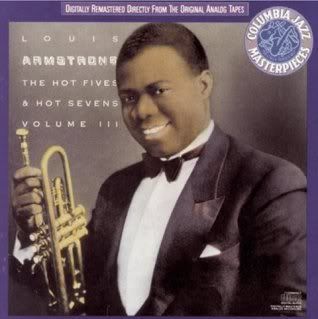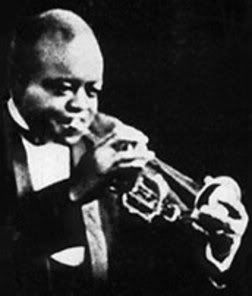It's been a while since my last post. The main reason for the break is that I have spent a lot of the time researching the early music of Louis Armstrong (definitely pronounced with an s, not Lou-ee.) And quite frankly I have been overwhelmed. I simply had no clue as to the extent of this man's influence, not only over jazz, but over 20th century popular music as a whole. My personal impressions of him were formed when I was growing up. I had an image of the classic Louis Armstrong, the vaudevillian-esque performer with the deep husky voice. I remember the countless commercials/advertisements that have used his later music, including "We have all the time in the world" and "Wonderful World." This was, embarrassingly, the extent of my knowledge of the man and his music.
So it was with some frustration that I first listened to his Hot Five and Hot Seven recordings. These were Louis Armstrong's first solo recordings made for the Okeh label in Chicago between 1925 and 1929. I say frustration because I cannot believe it has taken me this long to listen to some music that is so clearly iconic. These records clearly illustrate a turning point. They are the link between the old style "dixie" jazz and all other forms of jazz that came after.

This isn't the first time that we have come across Louis Armstrong's work. I first mentioned him in this blog when I looked at the music of his mentor, Joe "King" Oliver. Those recordings of the Creole Jazz Band are clearly in the old classic New Orleans style - each of the main instruments overlapping behind the main melody. Louis Armstrong changed all that. The opening blast of West End Blues (an Oliver composition) announces the new style.
What I found particularly striking about these recordings was how fresh his playing sounds. We are still talking about a fairly primitive period in terms of sound recording and the music has that "crackly" 1920's feel. Yet Armstrong's trumpet playing sounds like it could have been recorded yesterday, such is its clarity. As mentioned there was a lot more emphasis on the soloing ability of the musicians and obvious improvisation (check out Struttin' With Some Barbecue). Potato Head Blues employs a stop time solo which was light years ahead of its time and something that rock musicians later employed - think Led Zeppelin's Whole Lotta Love.
Lonnie Johnson was brought in for some of the recordings. Again, a musician that I have heard of through interviews with BB King and Mark Knopfler but I am ashamedly ignorant of in terms of his music. However his guitar playing jumps out of the tracks I'm Not Rough and Hotter Than That. In the latter song there is a wonderful call and response with Armstrong scatting to Johnson's guitar. The duet with Earl Hines in the song Weather Bird is also superb (although not part of the Hot Five sessions)
It is something of an understatement to say how superb these songs are. Yet it should be noted that the Hot Five and Hot Seven line-ups never performed live. The sessions were fairly informal in nature (as evidenced in the track A Monday Date) However, the influence the music was to have over the future of jazz is, in my opinion, obvious.
Click here for a great documentary from NPR regarding Louis Armstrong's early career.
